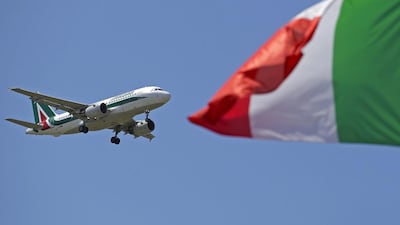When Silvano Cassano was offered a chance last year to go back to running a company after working as a consultant, he told himself, “if it’s in Italy, no thanks.”
Today, he oversees not just any company, he’s agreed to take on one of Italy’s biggest corporate turnarounds: Alitalia. After decades of losses and defecting customers, Mr Cassano is making a last-ditch effort to rebuild the national carrier. His plan: dropping unprofitable short-haul routes in favour of intercontinental flights, upgrading technology and pampering customers with better food and seats.
The former executive at Fiat and Benetton Group says he signed up for the task because he was drawn by the prospect of reviving a storied company - the first flight took place in 1947 - with the help of a strong international partner. Etihad Airways, the Abu Dhabi carrier, owns 49 per cent of Alitalia, and Etihad’s boss, James Hogan, worked with Mr Cassano at car-rental company Hertz in the 1990s.
“Alitalia can only thrive as a five-star airline,” Mr Cassano said in an interview at Rome’s Fiumicino airport, as planes painted in the green, red and white company livery taxied on the runway behind him. “Consumers are saying: give us an excuse to come back to you. They want the love affair to start again.”
The chief executive, who cuts a wiry figure in his cropped hair and tailored suits, plans to invest €700 million (Dh2.82bn) over the next three years, half of which will go toward a complete overhaul of the fleet, starting with two new Airbus A330 wide-body airliners to be unveiled in June. Another €100m will be invested for technology.
Mr Cassano has the backing of the political elite and of Etihad’s Mr Hogan, whose company led a €1.76 billion investment to revive the company. That lifeline didn’t come without some demands: Alitalia had agreed to cut 2,000 jobs, even before an accord was sealed.
By 2017, all Alitalia planes will offer Wi-Fi, better food, and new business-class seats decked out in leather, probably from high-end Italian furniture manufacturer Poltrona Frau. Mr Cassano said he’s also considering a refreshed livery design to reflect the company’s rebirth.
“A small airline can survive only if it gets into the niche lucrative premium segment of long-haul flights,” said Andrea Giuricin, a professor at Milan’s Bicocca University who studies the aviation industry.
Mr Cassano is acutely aware of the fact that he can’t turn back time. Alitalia’s short-haul business has all but evaporated as high-speed trains took over in recent years and many customers switched to budget carriers Ryanair and Easyjet, which have opened up bases in Italy.
For his long-haul expansion, Mr Cassano is focused on attracting customers in fast-growing countries in Asia. Alitalia is in talks for a code-share agreement in China in order to reach the country’s 30 top destinations with the help of a local partner. Alitalia will also add routes from Bologna and Catania in Italy to Abu Dhabi, from where passengers can connect on Etihad flights to Africa, India and Australia.
For Mr Cassano, Alitalia’s link with a powerful investor is the model for Europe’s aviation landscape, which he predicts will consolidate around a few major airline groups besides low-cost carriers. Non-European rivals are barred from owning a carrier in the region outright, or else they would lose the landing rights, an airline’s most prized asset.
Alitalia still represents a major challenge. The airline has been unprofitable for almost two decades and customers have moved on to other travel options. Its recent history has been marked by political meddling and lacklustre support from investors.
In 2008, former premier Silvio Berlusconi asked a group of “courageous patriots” to save the company and keep it in Italian hands, rebuffing a previous takeover bid from Air France. The bailout cost Italy at least €4bn including losses and a state-subsidised program to cut jobs, according to research by Milan Bicocca University.
Five years later, the government stepped in again to rescue Alitalia in a €500m package that involved the country’s postal service and two largest banks. After studying the books for a year and working through its list of demands, Etihad last year agreed to buy a stake, adding to its collection of airline holdings it has amassed around the world.
For Mr Cassano, the complexity of the turnaround lies partly in the fact that every part of the company needs attention - from fleet upgrades to new technology to crew training and network improvements. To reflect his ambitions, Mr Cassano has ordered Alitalia’s headquarters be refurbished, saying he can’t motivate employees if they feel that they toil in squalor.
He recalled his first impression of the airline last year when he entered the head office, with only lawyers and consultants on site.
“There was nothing: no vibration, no activity,” Mr Cassano said.
Today, he holds weekly meetings with staff, including pilots, a small yet powerful cohort among employees. “I really feel invigorated when I can have 200 people in front of me, from whatever department, to have a very clear discussion with them: let’s cut the bureaucracy.”
business@thenational.ae
Follow The National's Business section on Twitter

